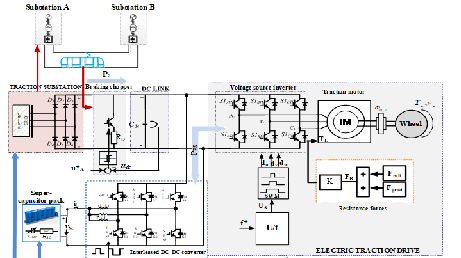


Indian Journal of Science and Technology
Year: 2021, Volume: 14, Issue: 23, Pages: 1914-1928
Original Article
An Thi Hoai Thu Anh 1, Nguyen Van Quyen 2,*
Received Date:18 April 2021, Accepted Date:27 May 2021, Published Date:02 July 2021
Objectives: To verify the energy efficiency operation of electrified trains on the certain metro line, in Vietnam by combining two solutions to recover regenerative braking energy with on-board supercapacitors and tracking the optimal speed profile. Methods: This study proposes an integrated optimization method: applying Pontryagin's maximum principle (PMP) finds the optimal speed profile with fixed running time and recuperating regenerative braking energy by designing the control method — Current Mode Control (CMC) to manage charge/discharge process of the on-board supercapacitor energy storage system (SCESS) tracking the optimal speed profile. Findings: With this approach, a considerable reduction in consuming energy obtained for Cat Linh-Ha Dong metro line, Vietnam has been verified by simulation results on MATLAB and MAPLE software indicating that applying PMP, the highest operation energy saving is 10.15%, but if both solutions PMP and SCESS are applied, the energy saving level increases up to 14.7% in comparison with simulation results of the case of original speed profile. Novelty: Combining two energy saving solutions simultaneously: applying PMP to determine the optimal speed profile and using super-capacitors with CMC algorithm have recuperated the regenerative braking energy. The level of energy saving is higher than other saving solutions.
Keywords
Pontryagin's Maximum Principle, Supercapacitor Energy Storage System, Current Mode Control, EnergyEfficiency Operation, Timetable Optimization
© 2021 Anh & Quyen. This is an open-access article distributed under the terms of the Creative Commons Attribution License, which permits unrestricted use, distribution, and reproduction in any medium, provided the original author and source are credited. Published By Indian Society for Education and Environment (iSee)
Subscribe now for latest articles and news.